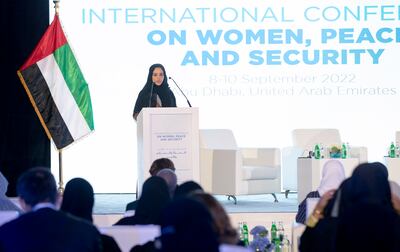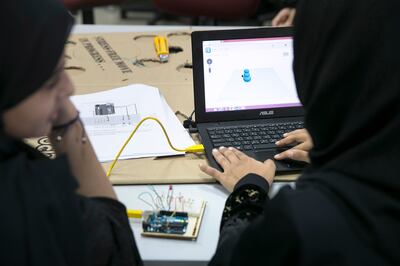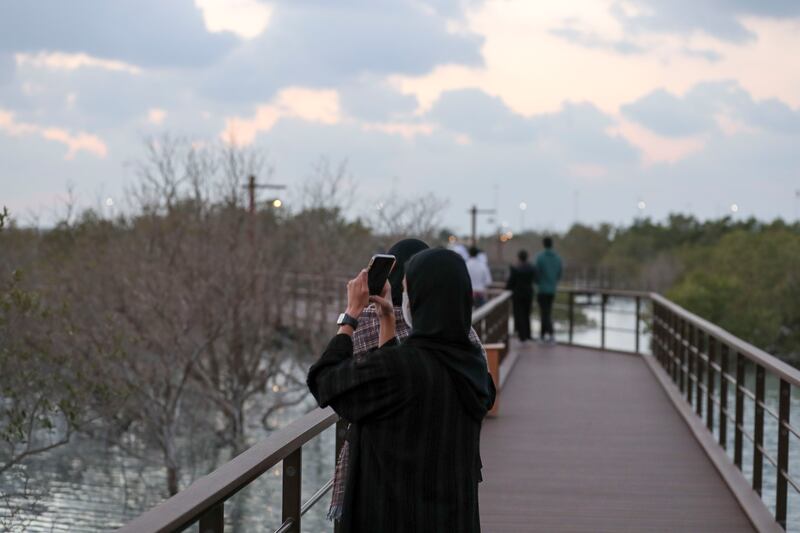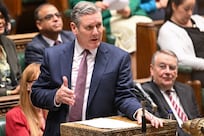As we fast approach Cop28 this year, we must look to our key drivers of collaboration to help build and deliver global consensus on tangible, concrete next steps to keep 1.5°C within reach. Those key drivers I am referring to are, of course, Emirati women.
Emirati Women’s Day is not only an opportunity for us to celebrate the example set by our women and girls. It is also a chance to show the international community what we are capable of when we work together – especially when it comes to setting the energy transition and climate action agenda.
The theme for this year’s Emirati Women’s Day, which arrives just less than 100 days ahead of Cop28, is: “We Collaborate for Tomorrow.” It is an apt description for the role Emirati women have played since our nation’s inception.
One such recent example comes from Abu Dhabi this year, when the “Climate Change and Gender Equality” initiative was born. Spearheaded by Sheikha Fatima bint Mubarak, the Mother of the Nation, the Ministry of Foreign Affairs, the General Women’s Union and the UN Women Liaison Office for the GCC, this initiative underlines the UAE’s proactive approach to two intertwined challenges: climate change and gender equality.
Set to facilitate dialogues about the intersectionality between gender and climate, the initiative will address topics such as the differential impacts of extreme weather patterns on women and girls, the role women play in climate decision making, and the specific needs and viewpoints of women and girls in frontline communities, in the context of a changing climate.
This collaboration between the UAE and UN Women is an example of how international partnerships can amplify local efforts, which Mouza Al Shehhi, director of the UN Women’s liaison office in the region, underscored when the initiative was launched.

The foresight and leadership of Emirati women in bringing this initiative to the world is symbolic of a wider pattern in our society: prominent Emirati women have become beacons of climate progress.
As the UAE gears up for Cop28, it’s clear to see that Emirati women are not just active participants on this journey to a climate resilient, sustainable future, but key drivers and shapers of it. The global community stands to benefit from such an inclusive approach.
While representing the UAE on the international stage, I have witnessed first-hand how Emirati women are some of the most compelling champions for collaboration. At Cop27, my female colleagues, who made up a significant portion of the UAE’s 1,000-strong delegation, were instrumental in negotiations, dialogues and agreements with our international counterparts, including an MoU with Egypt to develop one of the world’s largest onshore wind projects.
It was clear then, as it is now, that Emirati women play a central role in global climate diplomacy, focusing their efforts to foster collaboration among nations.
Today, women account for more than a third of leadership positions in the Ministry of Climate Change and Environment, which is a key mediator in global climate action efforts.
But these leadership roles are by no means recent. Emirati women leaders have always been part of the fabric of the Emirates. The 2020 Women in Sustainability Report found that Emirati women-led delegations had been crucial in forging more than 20 international environmental treaties and agreements.
One of the reasons more Emirati women are leading climate partnerships is the rising interest and participation of UAE citizens in Stem fields, which is helping to fuel the UAE’s emergence as a global powerhouse in renewable energy.
Over the past decade, there has been a 77 per cent increase in the participation of Emirati women in Stem fields. Today, Unesco figures indicate 61 per cent of Stem graduates in the UAE are women, compared to an average 57 per cent in the rest of the Arab world.
Perhaps it is not surprising then to know that women – including Emiratis – now account for about a quarter of the UAE’s nuclear energy sector. That’s one of the highest industry percentages globally.
Emirati women not only occupy vital technical roles in sectors such as nuclear, solar and wind, but sit at the helm of the country’s renewable energy agenda. In fact, they have occupied lead roles in more than 50 per cent of the country’s renewable energy initiatives.
In these roles, Emirati women have been responsible for fostering important international collaborations that brought advanced technology to the region and supported the progress of renewable energy projects locally and abroad.

Beyond renewable energy, women have been at the heart of the UAE’s progress towards the UN’s Sustainable Development Goals. Through both domestic and international collaborations, Emirati women have championed sustainable development by shaping the sustainability dialogue, developing clean energy solutions and the development of smart cities.
The 2020 Women in Sustainability report noted that projects led by Emirati women resulted in a 30 per cent increase in sustainable urban development initiatives in the previous five years – often in collaboration with international partners and led by the UAE National Committee on SDGs.
The rich experiences of collaboration the many thousands of Emirati women have acquired in our national history have positioned them uniquely for leadership in climate and energy sectors.
These experiences, combined with their skill and ability to mobilise stakeholders, have produced some of the world’s most influential leaders in climate diplomacy, renewable energy and sustainable development.
More than that, the collaborative efforts of Emirati women in these critical fields epitomise the UAE’s approach to climate action.
The country’s leadership has built an approach to collaboration that will serve as a linchpin of the UAE’s future climate action and enable an inclusive and action-oriented Cop28 this year.
It is an approach that is forecast to help the country exceed its Paris Agreement commitments by 2030, representing a pace of progress that proves collaboration really does hold the key to a more sustainable future for humanity.
Today is about recognising the role of Emirati women in our national story, amplifying the successes they have led, and providing the platform for more.
Their example must be used as a tool to promote greater inclusivity and collaboration across genders and sectors. And it must serve as an inspiration to the international community to integrate collaboration into all climate and energy strategies for an inclusive and just transition.
“We Collaborate for Tomorrow” must become a rallying call – not just on Emirati Women’s Day, but across every sector in the lead-up to Cop28 and far beyond.





